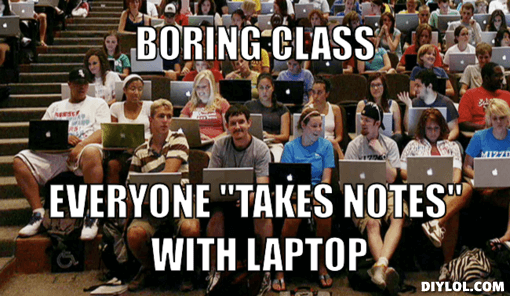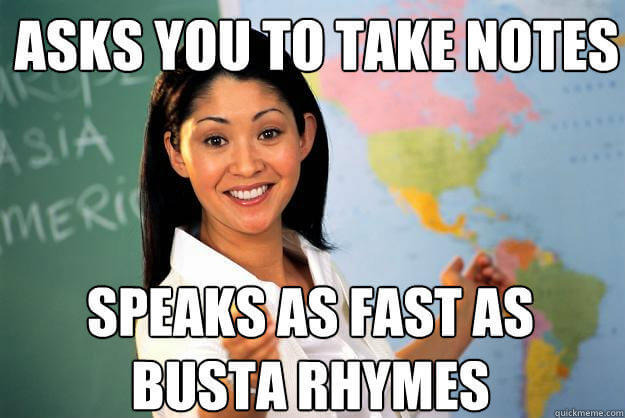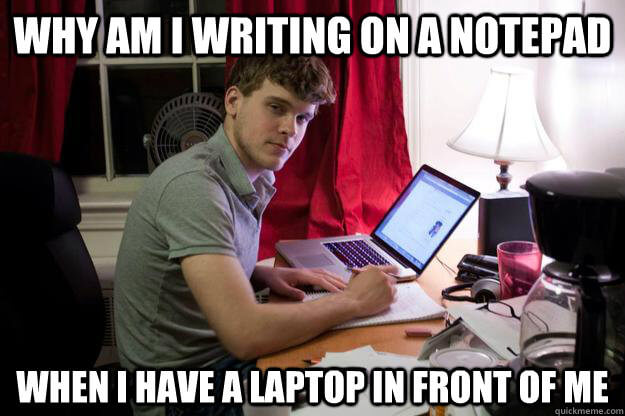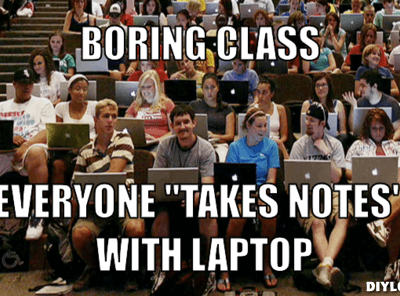
The academic community has long debated whether laptops should be allowed in classrooms. Yet, in every large lecture hall there are two things you’ll hear: the professor’s tedious drone and the incessant clicking of students typing. Most aren’t taking notes, of course, because class hours are so convenient for shopping on Zappos and taking BuzzFeed personality quizzes. But for those who actually rely on laptops for note taking, is it really more efficient?
Benefits of Going Digital
Having your notes digitally documented makes it easier to keep everything organized. Saving your lessons to one folder labeled as Schoolwork, definitely beats shuffling through a binder full of loose papers. A lot of professors post presentations online beforehand, and writing your notes directly on the slides can streamline your studying later.
If you’re tired of lugging around the 5,000-page Oxford Anthology of Shakespeare three days a week, sites like Amazon have a handy alternative. They allow students to rent e-textbooks at less than half the price of the paperback. Your lower back will thank you for it, and studying will go by a lot faster when you’ve got Ctrl+F at your disposal.
Why Longhand Might be Superior

(Photo courtesy of quickmeme.com)
Despite your laptop’s utility, recent studies have shown that leaving your Macbook at home might boost your grades even if you’re not the type to drift onto Facebook halfway through a lecture. A study published this year in Psychological Science suggests that writing notes longhand leads to better long-term memory retention.
Typing a lecture verbatim is usually students’ first instinct, but the researchers say the benefit of recording information word-for-word is negated by what they call mindless transcription. In other words, you’re just copying, not thoroughly processing the information like you would if you summarized and wrote out the concepts by hand.
If you’re a physics or advanced mathematics student, ditching notes altogether might help you grasp complex theoretical concepts. Instead of frantically writing down every formula, many of my engineer friends find that listening carefully makes it easier to follow the trajectory of the lesson and wrap their minds around abstract ideas. This doesn’t work for everyone, as we all learn differently but it’s worth a try if you find yourself falling behind in Calc II.
Finding Middle Ground

(Photo courtesy of quickmeme.com)
If you’re a stickler for going digital, it is possible to have the best of both worlds. All you need is an iPad and a stylus pen like the Jot Touch. Apps such as Notability and GoodNotes allow you to intuitively and cleanly write your notes on the screen and upload them to Cloud storage or a dropbox. For the Android tablet users out there, Quill works just as well.
Transcribing your written notes to a digital format is also a useful study tool, as re-typing the lesson ideas further cements the concepts in your brain. They’re also much easier to process when they’re written down in your own words.
Experiment with different learning techniques, and familiarize yourself with how your own brain works. Study techniques that work for the kid with the highest grade might not work for you, but that doesn’t mean you’re any less intelligent.
(Main photo courtesy of diylol.com)



















